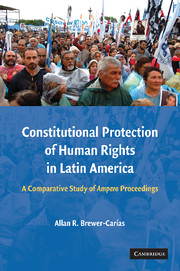 Constitutional Protection of Human Rights in Latin America
Constitutional Protection of Human Rights in Latin America Book contents
- Frontmatter
- Contents
- INTRODUCTION
- PART ONE THE CONSTITUTIONAL AND INTERNATIONAL DECLARATION OF HUMAN RIGHTS AND ITS JUDICIAL GUARANTIES
- Chapter One The Constitutional Declaration of Human Rights in Latin America and Its Internationalization
- Chapter Two Judicial Guaranties of the Declaration of Human Rights
- PART TWO THE AMPARO AS A LATIN AMERICAN CONSTITUTIONAL AND INTERNATIONAL LAW INSTITUTION
- PART THREE THE INJURED PARTY AND THE CONSTITUTIONAL RIGHTS PROTECTED BY MEANS OF THE AMPARO PROCEEDING
- PART FOUR THE INJURY, THE INJURING PARTY AND THE INJURING ACTS OR OMISSIONS IN THE AMPARO PROCEEDING
- PART FIVE THE EXTRAORDINARY CHARACTER OF THE AMPARO PROCEEDING
- CONCLUSION
- APPENDIX A List of Latin American Constitutions
- APPENDIX B List of Latin American Amparo Laws (Statutes)
- INDEX
Chapter Two - Judicial Guaranties of the Declaration of Human Rights
Published online by Cambridge University Press: 08 August 2009
- Frontmatter
- Contents
- INTRODUCTION
- PART ONE THE CONSTITUTIONAL AND INTERNATIONAL DECLARATION OF HUMAN RIGHTS AND ITS JUDICIAL GUARANTIES
- Chapter One The Constitutional Declaration of Human Rights in Latin America and Its Internationalization
- Chapter Two Judicial Guaranties of the Declaration of Human Rights
- PART TWO THE AMPARO AS A LATIN AMERICAN CONSTITUTIONAL AND INTERNATIONAL LAW INSTITUTION
- PART THREE THE INJURED PARTY AND THE CONSTITUTIONAL RIGHTS PROTECTED BY MEANS OF THE AMPARO PROCEEDING
- PART FOUR THE INJURY, THE INJURING PARTY AND THE INJURING ACTS OR OMISSIONS IN THE AMPARO PROCEEDING
- PART FIVE THE EXTRAORDINARY CHARACTER OF THE AMPARO PROCEEDING
- CONCLUSION
- APPENDIX A List of Latin American Constitutions
- APPENDIX B List of Latin American Amparo Laws (Statutes)
- INDEX
Summary
Constitutional declarations of rights, in the constitutions or in international treaties and covenants, would be of no use at all if those rights were not supported by a set of constitutional guaranties for their protection.
So, if the first of all constitutional guaranties is the guaranty of the supremacy of the constitution and its content; the second is the judicial guaranty, that is to say, the set of judicial means established in benefit of persons in order to assure not only the supremacy of the constitution but the effective exercise and protection of the rights therein contained.
Regarding the supremacy of the constitution and the role of the judiciary, one important feature of the Latin American contemporary constitutionalism is that they are not just a deduction constructed from constitutional clauses, as was formulated by Alexander Hamilton in his writings in The Federalist (1788), where he referred to the constitution as a fundamental and superior law; to the role of judges as the interpreters of the constitution, being obliged to prefer it to the statutes, and to their power to pronounce legislative acts void, when contrary to the constitution. This was the doctrine later developed by the courts, and in particular, by the Supreme Court after Marbury v. Madison U.S. (1 Cranch), 137; 2 L. Ed. 60 (1803).
Instead, in Latin America, the principles have been explicitly set forth in the text of many constitutions.
- Type
- Chapter
- Information
- Constitutional Protection of Human Rights in Latin AmericaA Comparative Study of Amparo Proceedings, pp. 62 - 80Publisher: Cambridge University PressPrint publication year: 2008


